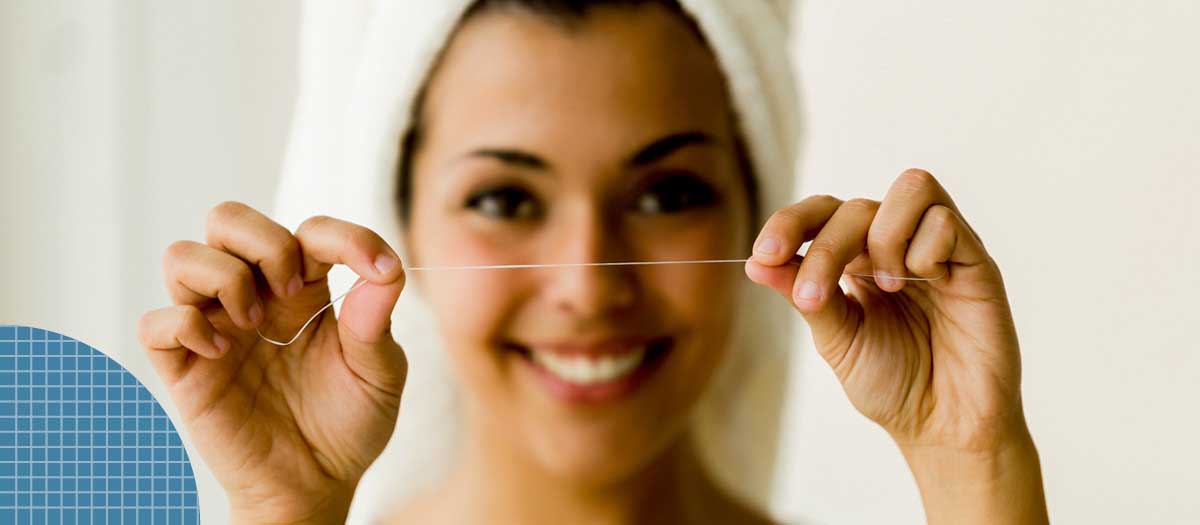Why You Should Floss

Updated Sept 2021
Flossing probably isn’t on your list of favorite things to do, but there are plenty of solid reasons why you should add it to your daily routine. Plus, when you consider the benefits, and the fact that it really only takes a couple of minutes, flossing isn’t such a hassle after all.
What are some of the many reasons why dentists and dental hygienists are always interested in whether or not you’re flossing regularly? Check out the info below to discover why brushing alone isn’t enough.
1. Brushing Can Only Do So Much
Sure, brushing is absolutely necessary if you want to maintain healthy teeth and gums, but did you know that it likely won’t do a good enough job at removing plaque? According to experts, 40% of the work of getting rid of plaque is attributed to flossing. This means it plays an important role in preventing tartar, cavities, and gum disease.
How is this possible? Well, brushing can hit most surfaces of your chompers, but the bristles won’t be able to get in between your teeth like floss can. It’s that simple!
2. Flossing Helps Remove Plaque Before It Turns to Tartar
You’ve heard of plaque and tartar, but you might now know the difference between them. Basically, if plaque isn’t removed from your pearly whites by thoroughly brushing and flossing to clean every surface of every tooth, it can harden into tartar. And it doesn’t take long either—plaque might start to harden into tartar in as little as 24 hours! This is why dentists recommend flossing at least once a day.
What’s the big deal about tartar? Because it sticks to your teeth and gums, it may increase your risk of cavities, gum disease, and gum recession. Plus, even though you can brush and floss away plaque, tarter isn’t something that you can easily remove at home; instead, you’ll need the help of your dentist to do that.
3. It Helps You Keep Your Gums Healthy
Having healthy gums can help ensure you won’t experience other problems, such as tooth loss. Again, floss can reach areas that your toothbrush misses, removing food particles and plaque so they won’t remain on your teeth and gums.
Note: Your gums may bleed a bit when you floss, and that might deter you from flossing regularly. But if you keep at it, within a short span of time, your gums likely won’t bleed anymore. That’s because the act of flossing can help promote healthier gums.
4. Your Smile Might Become Brighter
As mentioned above, if you leave plaque on your teeth, it will end up hardening into tartar, which is yellow or brown in color. So, when you’re able to remove plaque before it turns into unsightly tartar, you can take a step toward maintaining a brighter, whiter smile. And who doesn’t want that?
Not Flossing? It’s Time to Start!
As you can see, there are several great reasons why flossing should be an integral part of your at-home oral hygiene routine, rather than something you do only when food gets stuck between your teeth.
With so many different products out there, from string floss and water flossers to floss designed for sensitive gums, tight teeth, and braces, you can select the one that’s just right for you. Whichever type of floss you choose, the key is to do it consistently, such as once a day—it doesn’t even really matter what time of day you floss!
Bottom line: once you include flossing in your routine, you should find that your mouth feels fresher, and your dentist might even be impressed by how much cleaner your teeth look when you go in for your next professional cleaning.
Sources:
https://www.webmd.com/oral-health/features/still-not-flossing-more-reasons-why-you-should
https://crest.com/en-us/oral-health/conditions/tartar-plaque/plaque-tartar-causes-prevention-removal
https://www.webmd.com/oral-health/guide/tartar-dental-calculus-overview
https://oralb.com/en-us/oral-health/solutions/floss/the-benefits-of-flossing-your-teeth/
https://www.mouthhealthy.org/en/az-topics/f/flossing
